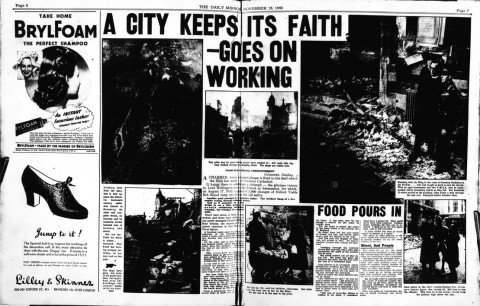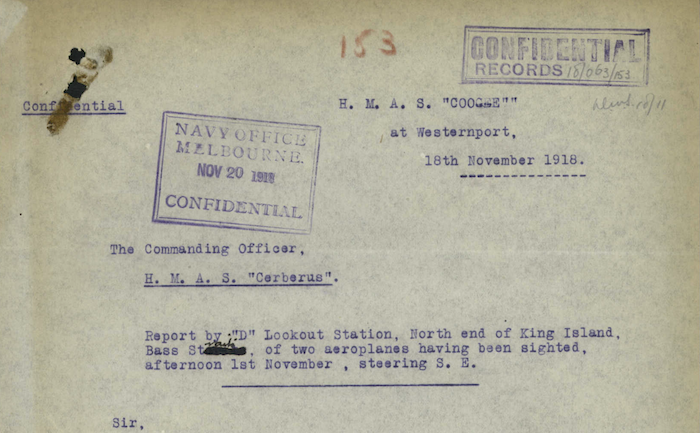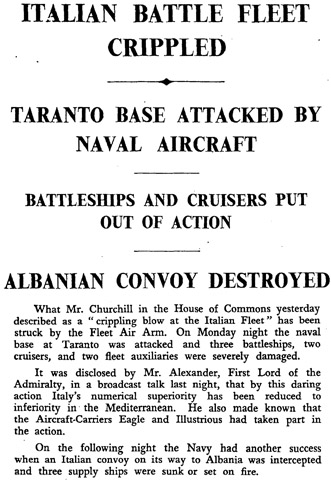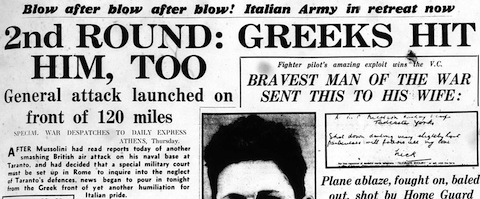
The Daily Mirror likes its headlines big and bold. The one above takes up two-thirds of the width of today’s front page. The story is that Arthur Greenwood, Minister without Portfolio in the War Cabinet (and deputy leader of the Labour Party; interesting that he is not described as such in an ostensibly left-wing newspaper) has claimed that Germany is suffering from aerial bombardment more than Britain — fifty times more, to be precise (though I’m not sure if that’s just last week or over the whole war). Partly this is due to ‘The R.A.F.’s mastery of night flying, which enables them to take off in weather which grounds the Germans’.
Mr. Greenwood, who spoke at Colchester, said the past week had been a bad one for the enemy. It had opened a new chapter in the war. “I myself have gained heart,” he said. “I am satisfied of [sic] the result.”
He said that serious as were the enemy attacks on such places as London, Coventry, Birmingham and Liverpool, the R.A.F. had handed out greater punishment. “I am not concerned with the killing of people in Germany,” he declared. “I am concerned with killing their power to strike at us.”
On that subject of killing, the death toll at Coventry has now reached 250.
The Mirror is easily the paper most concerned with the city’s ordeal today. Patience Strong weighs in with a poem called ‘Coventry’ (5):
The martyred City, gashed and scarred — her children slain, her beauty marred — Still proudly stands, but to the sky — the very stones for vengeance cry.
As Nations sow, so must they reap — They, too, for this night’s work shall weep — such deeds their retribution bring — God speed the Day of Reckoning.
The Mirror‘s editorial takes the occasion of the King’s visit to Coventry to reflect on the value of the monarchy ‘in our great and inspiring cause’:
The royal visit to Coventry and other places afflicted by the foul enemy touches the British public deeply. The King goes as the sovereign head, not only of a great and free people, but as the first representative of civilisation fighting against the German pestilence.
In his courage, gentle personality and practical knowledge of affairs, King George symbolises the democratic ideal at its best.
Aside from the advertisements (BrylFoam, Lilley & Skinner), pages 6 and 7 are entirely given over to to Coventry’s recovery:

The paper’s special correspondent reports on a Sunday service at the ‘sorely damaged’ Church of the Holy Trinity, where the priest asked God to grant his followers peace:
Peace is something that Coventry cannot hope to know yet, except in its heart. It has been torn by too savage a wound for the scars to vanish soon.
Yet, the heart is sound, the heart of the place which is the central city of England.
So many have left the city — want of homes, not fear, has driven them away — and left behind is the core.
And this core the maggot of Nazidom will attack in vain. Its quietly resolute citizens are England.
Away in Sussex, the vicar of Glynde, the Reverend J. R. Lawson, has disagreed with the vicar of neighbouring Firle, the Reverend A. G. Gregor, over ‘the “Christ and Angels” vision, said to have been seen in the sky‘ by the latter’s parishioners (3). (Not the same vision as reported by Air Raid Warden of Ruislip last week.) Rev. Gregor does not believe in the vision. Rev. Lawson said:
“I think those people who say they saw the vision were too much in earnest to be discredited. After all, our Christian religion is based on the vision of Bethlehem, which was only seen by a few. Therefore, why should not the story of apparently quite earnest people living today be equally believed? I certainly think the vision was seen and I only wish I had seen it myself.”
I wonder if the people of Firle thought Christ was bringing peace, or a sword?
![]() This work is licensed under a Creative Commons Attribution-NonCommercial-NoDerivatives 4.0 International License.
Permissions beyond the scope of this license may be available at http://airminded.org/copyright/.
This work is licensed under a Creative Commons Attribution-NonCommercial-NoDerivatives 4.0 International License.
Permissions beyond the scope of this license may be available at http://airminded.org/copyright/.



